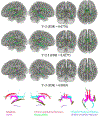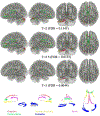DTI Connectometry Analysis Reveals White Matter Changes in Cognitively Impaired World Trade Center Responders at Midlife
- PMID: 35964183
- PMCID: PMC9730899
- DOI: 10.3233/JAD-220255
DTI Connectometry Analysis Reveals White Matter Changes in Cognitively Impaired World Trade Center Responders at Midlife
Abstract
Background: More than 8% of responders who participated in the search and rescue efforts at the World Trade Center (WTC) following 9/11 developed early-onset cognitive impairment (CI). Approximately 23% were also diagnosed with chronic post-traumatic stress disorder (PTSD).
Objective: To shed light on the pathophysiology of these WTC-related conditions, we examined diffusion connectometry to identify altered white matter tracts in WTC responders with CI and/or PTSD compared to unaffected responders.
Methods: 99 WTC responders (mean age 56 years) consisting of CI-/PTSD- (n = 27), CI+/PTSD- (n = 25), CI-/PTSD+ (n = 24), and CI+/PTSD+ (n = 23) were matched on age, sex, occupation, race, and education. Cognitive status was determined using the Montreal Cognitive Assessment and PTSD status was determined using the DSM-IV SCID. Diffusion tensor imaging was acquired on a 3T Siemens Biograph mMR scanner. Connectometry analysis was used to examine whole-brain tract-level differences in white matter integrity as reflected by fractional anisotropy (FA) values after adjusting for confounders.
Results: Analyses identified that FA was negatively correlated with CI and PTSD status in the fornix, cingulum, forceps minor of the corpus callosum and the right uncinate fasciculus. Furthermore, FA was negatively correlated with PTSD status, regardless of CI status in the superior thalamic radiation and the cerebellum.
Conclusion: This is the first connectometry study to examine altered white matter tracts in a sample of WTC responders with CI and/or PTSD. Results from this study suggest that WTC responders with early-onset CI may be experiencing an early neurodegenerative process characterized by decreased FA in white matter tracts.
Keywords: Alzheimer’s disease; World Trade Center Responders; cognitive impairment; diffusion tensor imaging; midlife; post-traumatic stress disorder; white matter connectometry.
Conflict of interest statement
The authors have no conflict of interest to report.
Figures





References
-
- Galea S, Ahern J, Resnick H, Kilpatrick D, Bucuvalas M, Gold J, Vlahov D (2002) Psychological sequelae of the September 11 terrorist attacks in New York City. N Engl J Med 346, 982–987. - PubMed
-
- Clouston SAP, Diminich ED, Kotov R, Pietrzak RH, Richards M, Spiro A 3rd, Deri Y, Carr M, Yang X, Gandy S, Sano M, Bromet EJ, Luft BJ(2019) Incidence of mild cognitive impairment in World Trade Center responders: Long-term consequences of re-experiencing the events on 9/11/2001. Alzheimers Dement (Amst) 11, 628–636. - PMC - PubMed
-
- Backman L, Small BJ, Fratiglioni L (2001) Stability of the preclinical episodic memory deficit in Alzheimer’s disease. Brain 124, 96–102. - PubMed
Publication types
MeSH terms
Grants and funding
LinkOut - more resources
Full Text Sources
Medical

